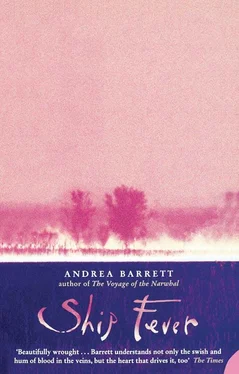Outside birds were speaking. Lauchlin was aware that he could no longer move his legs, that his spirit and his body were coming unglued from the feet up, like a pair of black-paper silhouettes separating. But it’s all right, he thought. The people moving around him would glue his two parts back together; no harm would come to him because what mattered was not his legs or the lack of feeling in them but all he knew and thought and felt. Of course nothing could happen to him, he loved Susannah and had told her so and she had acknowledged it. That she had never loved him, and never would, mattered not at all. What mattered was that he had understood that he loved her, and also his life and the world; what could happen to him now?
His memory turned and burrowed through the places he had loved. First it brought him the foothills of the Pyrenees, through which he’d tramped with Nicholas Benin one July, during a break in his studies. Then the upper reaches of the Ottawa — oh, he had hated being with his father, hated the business and the noise, but after all the place had been beautiful, the massive rapids and the unclouded sky and the smell, overwhelming and everywhere, of the trees. The white sails in the St. Lawrence, fluttering below the cliffs. His mother’s hair, the fragrance of the stables, the lobsters Annie had split and broiled, the market at the height of harvest, the weight and smoothness and promise of books — the cadavers, even, cool and preserved on a slab, slowly yielding the secrets beneath the skin.
What had he been doing these past years? What had he been so worried about? Fussing and struggling to build a practice, continue his research, establish himself — if he died now his life would have been only that, almost nothing, a chain of meaningless accomplishments and struggles. Why had he wasted so much time? When he was a boy, before his mother’s death, he had understood the beauty of daily life. Somehow this had slipped his mind, and if he died now — but of course he would not die now, he was very sick but it was all right, he was young and strong and outside the sun shone on the meadows and gulls plunged into the river, emerging with fish in their beaks — if he died now it would be ridiculous, because all these years he had not been living but readying himself to live, stuffing himself with knowledge that would help him live later. All this time he’d been learning to live, and now he was ready to start his life.
He opened his eyes. The room was dusky and no sun streamed through the window; he understood for the first time that these people he’d been caring for were, if not exactly him, extensions of him, as he was an extension of them. It was life, simply life, that they had in common, and if he could have his life back he could be happy with anything. That was Nora bending over him, sweet Nora who had shared a berth with death, and in his imagination he said to her: Isn’t it lovely, this life? Didn’t you love being on that ship, despite the horrors you endured? Didn’t you love the clouds and the sun and the rain, the smooth rolling waves and the leaping dolphins and the sight of the moon at night? From Telegraph Hill, he reminded her, we saw groves of silky white birch.
What was this shadow that lay over him now, if not the shadow that had lain over her and all the others? He smelled his own body, he had a slight erection, he remembered a young woman in Montreal, the grey wall next to him loomed. He became aware of a large, echoing space beyond the small space confining him. That space was filled with other beings, turning, murmuring, plucking their blankets as he plucked his; he knew his hands were doing this, but he could not control them. Those beings dreamed, like him. Count me, he thought, remembering a phrase he had once said in anger to someone he could no longer remember. Count me, count them, count us. [VI.]
Nora meant to leave the island, but she couldn’t seem to find the right moment. Early in September the flood of ships began to slow, and the number of patients to drop, but the staff well enough to care for them diminished correspondingly. There was a flurry of work in mid-September, when the new sheds at the eastern end of the island finally opened — twelve hundred patients to transfer, and so few people to help. For days she traced the muddy streets in carts, struggling to keep a few flaps of blanket over the sick and to cushion their heads against the jolting ride. Then the tents had to be struck, and the old sheds and the church had to be fumigated. Numb and exhausted, she did whatever Dr. Douglas asked.
All through October the number of patients decreased daily, but still there always seemed to be more work than people able to do it. One of the hospitals was closed, and then another; two of the physicians were discharged and with them their staffs. She might have left the island then, but there were children to comfort and old bedding to burn and floors to be scrubbed. The weather grew cold very rapidly; she did what she could to distribute the blankets and cast-off clothes sent by relief committees in the city. Slowly the island emptied. There were 500 patients the first week of October, and only three ships waiting at anchor. By the third week of October, all the convalescents had been sent upriver to Point St. Charles and only 60 patients remained.
The first snow had fallen by then. Dr. Douglas found some extra stockings for her, and a discarded coat, but at night a skim of ice began to form on the St. Lawrence and she was still cold much of the time. In a warehouse near the wharf were hundreds of boxes and trunks left behind by dead emigrants, along with a vast heap of their clothes, but she would not go into that room, she would rather freeze to death than touch those things. It was not fineness of feeling that stopped her, but fear of carrying the contagion. Along with the nurses and other attendants, she guiltlessly appropriated the money she found on the bodies of those who died without relatives. But she swept those shillings and occasional sovereigns into a leather purse with a stick, and before she touched them she boiled them in a saucepan of water.
She got a proper set of warm clothes only on October 30, the day the quarantine station was formally closed. That day a last, late ship limped into anchor; the Lord Ashburton, from Sligo, carrying tenants from the estates of Lord Palmerston. She thought she had seen everything by then, but this ship was the worst of all. Dr. Douglas was in a fury over it. Under a stunted pine on shore he stood shouting and waving his hands, arguing with another official she didn’t recognize; he had aged terribly in the few months she’d known him and his voice was hoarse and cracked. She had no way to comfort him. He was nothing like Lauchlin and kept her at a distance, although he seemed grateful for her hard work.
Dr. Jaques, who’d finally recovered, returned from his tour of the Lord Ashburton to report that over a hundred passengers had died on the voyage. Sixty were sick with fever and the crew was so debilitated that five passengers had worked the ship up the river to Grosse Isle. Had she not kept her grandmother’s training firmly in mind, she might have expired with rage and grief over the medical staff’s inability to help her fellow travelers. Their supplies were gone and the authorities declared that this last shipload was to be sent directly to Montreal. Among the surviving passengers, all were destitute and half were nearly naked. They could not disembark in any decency until clothes were provided for them.
Dr. Douglas asked Nora to help distribute among them the last shipment of cast-off garments rounded up by the Catholic women of Quebec, and in one of those relief parcels she found a blue woolen dress in surprisingly good shape, which she set aside for herself. Boots turned up as well, and a cloak and a kerchief. On the morning after the long day during which the Lord Ashburton’s passengers were clothed and sent upriver, Dr. Douglas called her into his office and dismissed her.
Читать дальше
Конец ознакомительного отрывка
Купить книгу












